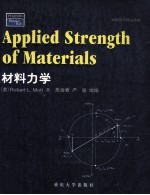图书介绍
材料力学 英文缩编版2025|PDF|Epub|mobi|kindle电子书版本百度云盘下载

- (美)莫特,朱渝春严波缩编 著
- 出版社: 重庆:重庆大学出版社
- ISBN:7562428840
- 出版时间:2005
- 标注页数:391页
- 文件大小:59MB
- 文件页数:400页
- 主题词:材料力学-英文
PDF下载
下载说明
材料力学 英文缩编版PDF格式电子书版下载
下载的文件为RAR压缩包。需要使用解压软件进行解压得到PDF格式图书。建议使用BT下载工具Free Download Manager进行下载,简称FDM(免费,没有广告,支持多平台)。本站资源全部打包为BT种子。所以需要使用专业的BT下载软件进行下载。如BitComet qBittorrent uTorrent等BT下载工具。迅雷目前由于本站不是热门资源。不推荐使用!后期资源热门了。安装了迅雷也可以迅雷进行下载!
(文件页数 要大于 标注页数,上中下等多册电子书除外)
注意:本站所有压缩包均有解压码: 点击下载压缩包解压工具
图书目录
1 Basic Concepts in Strength of Materials1
1-1 Objective of this Book—to Ensure Safety3
1-2 Objectives of this Chapter5
1-3 Problem-Solving Procedure6
1-4 Basic Unit Systems7
1-5 Relationship Among Mass,Force,and Weight8
1-6 The Concept of Stress10
1-7 Direct Normal Stress11
1-8 Stress Elements for Direct Normal Stresses13
1-9 Direct Shear Stress15
1-10 Stress Elements for Shear Stresses19
1-11 Bearing Stress20
1-12 The Concept of Strain24
1-13 Poisson's Ratio24
1-14 Shearing Strain26
1-15 Modulus of Elasticity26
1-16 Modulus of Elasticity in Shear27
1-17 Preferred Sizes and Standard Shapes27
1-18 Experimental and Computational Stress Analysis33
Problems38
2 Design Properties of Materials44
2-1 Objectives of this Chapter45
2-2 Metals in Mechanical and Structural Design45
2-3 Steel53
2-4 Cast Iron56
2-5 Aluminum56
2-6 Copper,Brass,and Bronze57
2-7 Zinc,Magnesium,and Titanium58
2-8 Nonmetals in Engineering Design58
2-9 Wood59
2-10 Concrete59
2-11 Plastics60
2-12 Composites60
Problems61
3 Design of Members under Direct Stresses62
3-1 Objectives of this Chapter63
3-2 Design of Members under Direct Tension or Compression63
3-3 Design Normal Stresses64
3-4 Design Factor65
3-5 Design Approaches and Guidelines for Design Factors67
3-6 Methods of Computing Design Stress70
3-7 Design Shear Stress72
3-8 Design Bearing Stress76
3-9 Stress Concentration Factors78
Problems80
4 Axial Deformation and Thermal Stress85
4-1 Objectives of this Chapter86
4-2 Elastic Deformation in Tension and Compression Members86
4-3 Deformation Due to Temperature Changes92
4-4 Thermal Stress95
4-5 Members Made of More Than One Material96
Problems98
5 Torsional Shear Stress and Torsional Deformation101
5-1 Objectives of this Chapter103
5-2 Torque,Power,and Rotational Speed104
5-3 Torsional Shear Stress in Members with Circular Cross Sections106
5-4 Development of the Torsional Shear Stress Formula108
5-5 Polar Moment of Inertia for Solid Circular Bars109
5-6 Torsional Shear Stress and Polar Moment of Inertia for Hollow Circular Bars110
5-7 Design of Circular Members under Torsion112
5-8 Comparison of Solid and Hollow Circular Members115
5-9 Twisting—Elastic Torsional Deformation118
Problems126
Computer Assignments128
6 Shearing Forces and Bending Moments in Beams129
6-1 Objectives of this Chapter130
6-2 Beam Loading,Supports,and Types of Beams131
6-3 Reactions at Supports139
6-4 Shearing Forces and Bending Moments for Concentrated Loads141
6-5 Guidelines for Drawing Beam Diagrams for Concentrated Loads147
6-6 Shearing Forces and Bending Moments for Distributed Loads150
6-7 General Shapes Found in Bending Moment Diagrams156
6-8 Shearing Forces and Bending Moments for Cantilever Beams157
Problems159
7 Centroids and Moments of Inertia of Areas161
7-1 Objectives of this Chapter161
7-2 The Concept of Centroid—Simple Shapes162
7-3 Centroid of Complex Shapes163
7-4 The Concept of Moment of Inertia165
7-5 Moment of Inertia of Composite Shapes whose Parts have the Same Centroidal Axis168
7-6 Moment of Inertia for Composite Shapes—General Case—Use of the Parallel Axis Theorem169
7-7 Mathematical Definition of Moment of Inertia172
7-8 Moment of Inertia for Shapes with all Rectangular Parts173
7-9 Radius of Gvration174
Problems178
Computer Assignments179
8 Stress Due to Bending180
8-1 Objectives of this Chapter182
8-2 The Flexure Formula183
8-3 Conditions on the Use of the Flexure Formula186
8-4 Stress Distribution on a Cross Section of a Beam188
8-5 Derivation of the F1exure Formula190
8-6 Applications—Beam Analysis191
8-7 Applications—Beam Design and Design Stresses194
8-8 Section Modulus and Design Procedures196
Problems200
Computer Assignments205
9 Shearing Stresses in Beams206
9-1 Objectives of this Chapter207
9-2 Importance of Shearing Stresses in Beams209
9-3 The General Shear Formula210
9-4 Distribution of Shearing Stress in Beams216
9 5 Development of the General Shear Formula221
9-6 Special Shear Formulas224
9-7 Design Shear Stress228
Problems229
10 Special Cases of Combined Stresses232
10-1 Objectives of this Chapter235
10-2 The Stress Element235
10-3 Stress Distribution Created by Basic Stresses237
10-4 Combined Normal Stresses242
10-5 Combined Normal and Shear Stresses248
Problems253
11 The General Case of Combined Stress and Mohr's Circle257
11-1 Objectives of this Chapter258
11-2 Creating the Initial Stress Element258
11-3 Equations for Stresses in Any Direction261
11-4 Principal Stresses265
11-5 Maximum Shear Stress267
11-6 Mohr's Circle for Stress268
11-7 Special Case in which Both Principal Stresses have the Same Sign275
11-8 The Maximum Shear Stress Theory of Failure280
Problems281
Computer Assignments282
12 Deflection of Beams283
12-1 Objectives of this Chapter285
12-2 The Need for Considering Beam Deflections286
12-3 Definition of Terms286
12-4 Beam Deflections Using the Formula Method289
12-5 Superposition Using Deflection Formulas294
12-6 Basic Principles for Bearn Deflection by Successive Integration Method295
12-7 Beam Deflections—Successive Integration Method—General Approach298
Problems307
Computer Assignments308
13 Statically Indeterminate Beams309
13-1 Objectives of this Chapter312
13-2 Formulas for Statically Indeterminate Beams312
13-3 Superposition Method320
Problems325
Computer Assignment328
14 Columns329
14-1 Objectives of This Chapter332
14-2 Slenderness Ratio333
14-3 Transition Slenderness Ratio336
14-4 The Euler Formula for Long Columns338
14-5 The J.B.Johnson Formula for Short Columns338
14-6 Summary—Buckling Formulas339
14-7 Design Factors for Columns and Allowable Load341
14-8 Summary—Method of Analyzing Columns342
14-9 Efficient Shapes for Column Cross Sections346
Problems347
Computer Assignments351
Appendix352
Answers to Selected Problems386
教学支持说明391
热门推荐
- 1523592.html
- 3564979.html
- 208896.html
- 707885.html
- 280612.html
- 1749874.html
- 1377459.html
- 1734346.html
- 219913.html
- 1697400.html
- http://www.ickdjs.cc/book_3340816.html
- http://www.ickdjs.cc/book_348978.html
- http://www.ickdjs.cc/book_695844.html
- http://www.ickdjs.cc/book_2356153.html
- http://www.ickdjs.cc/book_2000512.html
- http://www.ickdjs.cc/book_792873.html
- http://www.ickdjs.cc/book_1245687.html
- http://www.ickdjs.cc/book_815919.html
- http://www.ickdjs.cc/book_3339505.html
- http://www.ickdjs.cc/book_1054275.html